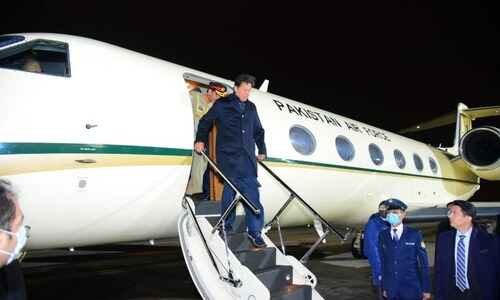UNITED NATIONS: Foreign Minister Bilawal Bhutto-Zardari on Thursday strongly defended Imran Khan’s Moscow visit, saying there was no way for the former prime minister to know that Russia would invade Ukraine on the day he landed in the Russian capital.
The foreign minister made these remarks during a news briefing at the UN headquarters when a journalist drew his attention to Mr Khan’s Feb 24 visit to Moscow and asked how the new government was going to rectify the 'mistakes' of its predecessors.
Read: Should the PM have gone to Moscow?
“As far the former prime minister’s trip to Russia, I would absolutely defend the former prime minister of Pakistan. He conducted that trip as part of his foreign policy and without knowing that — no one is psychic, no one has a sixth sense — there’s no way we could have possibly known that that would be the time [when] the current conflict will start,” Mr Bhutto-Zardari said. “And I believe it is very unfair to punish Pakistan for such an innocent action.”
Pakistan, he said, was “absolutely clear” that it has to stand by the principles of the United Nations, including that of non-use of force, on this issue.
Says Pakistan won’t take the side of any aggressor; calls for economic issues to be addressed on priority
“We are not part of any conflict. We do not wish to be part of any conflict. In fact, we would continue to emphasise on the importance of peace,” he said.
“We would continue to emphasise on the importance of dialogue and diplomacy to resolve this conflict as soon as possible. And we will certainly not take any side or take the side of any aggressor within this context.”
Later, when another journalist asked if this was just a “one-time exception” or the present government would defend its predecessors when it has to, Mr Bhutto-Zardari said: “As far as the former prime minister is concerned, I can’t defend his politics, I can’t defend his manifesto, I can’t defend his government.”
But there were occasions where he would defend the previous ruler, he said,
“In his capacity as prime minister, the way he conducted himself in foreign policy, particularly in context of this Russian trip, I will go as far as to defend the fact that he did not know the Ukraine conflict will start on the very day that he was there.”
Earlier, Mr Bhutto-Zardari said the new Pakistan government’s immediate priority was to address the country’s serious economic challenges — a message he repeatedly underlined in his bilateral meetings and in his address to the UN food security conference.
In one of these addresses, he noted that the people of Pakistan had the potential to not only meet their own food security needs, but also to feed the people of their region and others.
“Unfortunately, Pakistan has been unable to unlock its own agriculture and economic potential,” he said, adding: “We have suffered from the vestiges of colonialism, our own turbulent history and constant quest to improve our democracy.”
Pakistan, “caught in the crosshairs of global geo-politics,” also faced the “existential threats of climate change, Covid pandemic and poverty,” Mr Bhutto-Zardari explained. “All these factors make a country like Pakistan, not only food insecure…but water and energy insecure as well.”
In an interview to VOA while talking about his meeting with Secretary of State Antony Blinken, the foreign minister said he told the US foreign policy chief that Pakistan “believes in trade and economic ties, not in begging”.
This was an obvious effort to dilute the impact of Prime Minister Shahbaz Sharif’s statement about ties with the US, in which he had reportedly said that “beggars can’t be the choosers”.
Mr Bhutto-Zardari said the message that came out of his meeting with Mr Blinken was also clear, “we want to strengthen bilateral ties in the fields of economy, investment and regional security”.
On Thursday, he spoke with a powerful Republican senator, Lindsey Graham. “We agreed that broad-based US-Pakistan relations, especially in economic and trade areas, are critical,” he wrote in a tweet.
He also spoke to two other key lawmakers, Representatives Ami Bera and Adam Smith.
The only meeting where Kashmir, and not the current economic situation, was the focus was with UN Secretary General Antonio Guterres. He informed the UN chief that the quest for peace in South Asia would remain elusive until the Jammu and Kashmir issue was “resolved in accordance with the UN Security resolutions and wishes of the Kashmiri people”.
Published in Dawn, May 20th, 2022

































